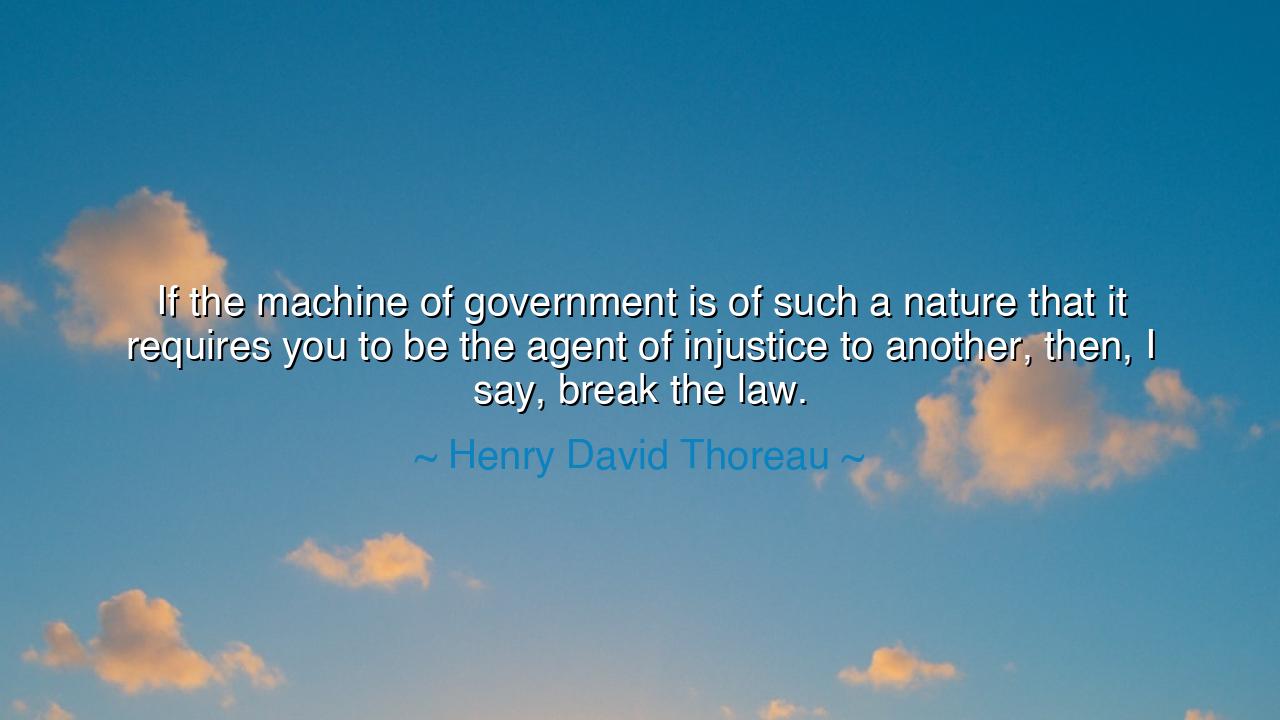
If the machine of government is of such a nature that it requires
If the machine of government is of such a nature that it requires you to be the agent of injustice to another, then, I say, break the law.






"If the machine of government is of such a nature that it requires you to be the agent of injustice to another, then, I say, break the law." — Henry David Thoreau
Hear these words, O seekers of truth, and let them strike your heart like the tolling of a solemn bell. Henry David Thoreau, philosopher, poet, and prophet of conscience, spoke them in an age of moral confusion and political cowardice. When he declared, “If the machine of government is of such a nature that it requires you to be the agent of injustice to another, then, I say, break the law,” he was not calling for chaos, but for courage — not for rebellion born of anger, but for resistance born of moral duty. He spoke as one who believed that the authority of conscience stands above the decrees of kings and parliaments. For when law commands the soul to betray what is right, it ceases to be law and becomes a weapon of oppression.
The origin of these words lies in Thoreau’s essay Civil Disobedience, written in 1849, when the young United States was torn between its ideals and its sins. The government, though built on liberty, had sanctioned slavery and waged a war of aggression against Mexico — acts Thoreau deemed unholy. Refusing to fund such injustice, he refused to pay his poll tax, declaring that no honest man should support a system that tramples the rights of others. For this, he was imprisoned. Yet in that brief confinement, he found not shame but revelation: that a man is richest when he possesses his integrity, even in a cell, and poorest when he surrenders it for comfort or compliance. Thus was born one of the greatest teachings of the modern age — that obedience to conscience is the highest form of citizenship.
In Thoreau’s eyes, the machine of government was a mighty structure — vast, metallic, relentless — a creation of men that had forgotten its master. When it demanded injustice, it turned citizens into cogs, grinding endlessly at the expense of human dignity. But Thoreau’s voice rose above its noise, saying, “No!” For he believed that one righteous act of refusal can halt the gears of oppression. “If the law commands you to be unjust,” he said, “break it.” In those few words lies the essence of civil disobedience — not rebellion for rebellion’s sake, but the refusal to serve evil, even when it is draped in legality.
History, O children of conscience, has proven the power of this principle. Look to Mahatma Gandhi, who read Thoreau’s essay and carried its spirit into India’s struggle for independence. He too broke unjust laws — peacefully, firmly, and with the strength of truth — until the empire that ruled a continent trembled before the will of the people. Look also to Martin Luther King Jr., who from a jail cell in Birmingham echoed Thoreau’s wisdom: “One has a moral responsibility to disobey unjust laws.” When governments compel silence in the face of cruelty, it is the duty of the just to speak. When power demands participation in evil, it is the duty of the righteous to withdraw. From these acts of conscience, revolutions are born — not of blood, but of spirit.
Thoreau’s teaching does not glorify disobedience; it glorifies integrity. He reminds us that law itself has no holiness except that which springs from justice. A people who obey blindly are like soldiers marching off a cliff; a nation that tolerates injustice in the name of order will soon find neither order nor honor. The chains of tyranny are not always forged by despots — sometimes, they are woven from the silent obedience of good men. Thus Thoreau cries out across the ages: when law and justice part ways, stand with justice, even if you stand alone.
But this lesson, though noble, is heavy with burden. To break the law for righteousness is not an act of ease; it is an act of sacrifice. It demands courage to face ridicule, prison, and loss — to endure the wrath of those who mistake submission for virtue. Yet, as Thoreau teaches, the price of obedience to evil is far greater: it is the slow death of the soul. Better the man who sleeps behind bars with a clean heart than the one who walks free while betraying his conscience. For in the great ledger of eternity, it is not law that defines us, but the truth we defend.
So, my children of the future, take this wisdom to heart. When government serves justice, support it; when it strays, challenge it. Do not fear to stand against the tide when the tide flows toward evil. Remember that every law is but the work of men, and men are fallible — but conscience is the voice of the eternal. Be neither anarchist nor slave, but citizen — a guardian of the sacred balance between authority and virtue. And if ever the machine of government commands you to harm your brother, your sister, your fellow soul, then stand firm, as Thoreau did, and say: “I will not.” For in that refusal, quiet and resolute, you become the truest servant not of man, but of justice itself.






AAdministratorAdministrator
Welcome, honored guests. Please leave a comment, we will respond soon